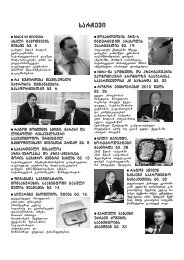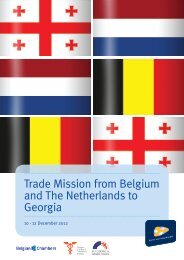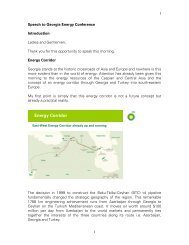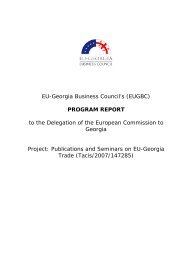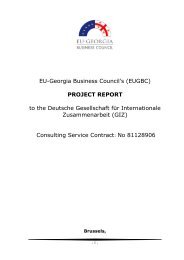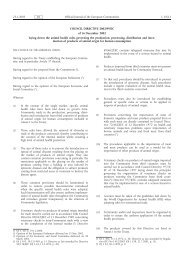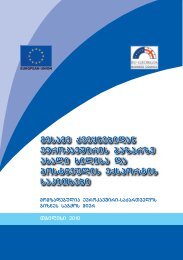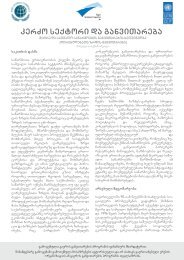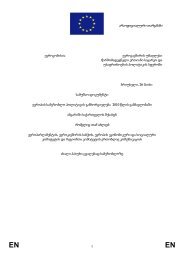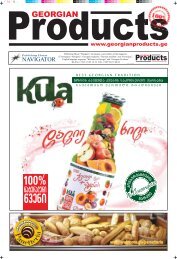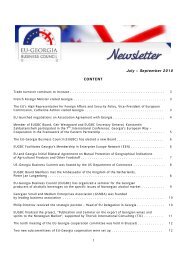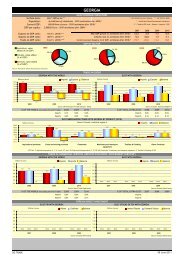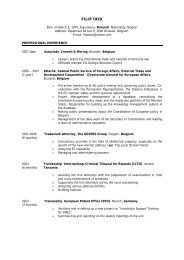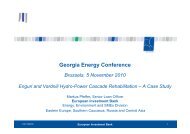January to March 2011 - EUGBC
January to March 2011 - EUGBC
January to March 2011 - EUGBC
Create successful ePaper yourself
Turn your PDF publications into a flip-book with our unique Google optimized e-Paper software.
CONTENT<br />
1<br />
<strong>January</strong> – <strong>March</strong> <strong>2011</strong><br />
EIB supports rehabilitation of Enguri and Vardnili hydropower plant cascade in Georgia . .<br />
Commission proposes €46 million macro-financial assistance <strong>to</strong> Georgia . . . . . . . . . . . . .<br />
Conclusion of two EU agreements with Georgia on visa facilitation and readmission . . . . .<br />
European External Action Service (EEAS) entered in<strong>to</strong> force from <strong>January</strong> <strong>2011</strong> . . . . . . .<br />
European Parliament resolution of 20 <strong>January</strong> <strong>2011</strong> - On an EU Strategy for the Black Sea<br />
Minister of Foreign Affairs of Georgia, Grigol Vashadze met with Commissioner for<br />
Enlargement and European Neighbourhood Policy Stefan Füle . . . . . . . . . . . . . . . . . . . .<br />
Business Ombudsman, Giorgi Pertaia met the heads of business associations operating in<br />
Georgia . . . . . . . . . . . . . . . . . . . . . . . . . . . . . . . . . . . . . . . . . . . . . . . . . . . . . . . . . .<br />
Meeting with the Ambassador of the Republic of Lithuania <strong>to</strong> Georgia, Jonas Paslauskas . .<br />
The debates at the Centre for European Policy Studies . . . . . . . . . . . . . . . . . . . . . . . . .<br />
The Georgia-Polish Business Forum held in Tbilisi on February 25 th . . . . . . . . . . . . . . . . .<br />
European Policy Centre reports . . . . . . . . . . . . . . . . . . . . . . . . . . . . . . . . . . . . . . . . . .<br />
GLOBSEC security forum was held in Bratislava . . . . . . . . . . . . . . . . . . . . . . . . . . . . . . . . . .<br />
Extended ministerial meeting of the Eastern Partnership was held in Bratislava . . . . . . . .<br />
EU sets out priorities <strong>to</strong> dismantle trade barriers. . . . . . . . . . . . . . . . . . . . . . . . . . . . .<br />
The fourth plenary session of negotiations on the future Association Agreement between<br />
Georgia and the EU held in Brussels . . . . . . . . . . . . . . . . . . . . . . . . . . . . . . . . . . . . . .<br />
<strong>EUGBC</strong> Secretary General Participated in the Seminar for the SME Coordina<strong>to</strong>rs Organized<br />
by European Commission . . . . . . . . . . . . . . . . . . . . . . . . . . . . . . . . . . . . . . . . . . . . .<br />
International Finance Corporation (IFC) Seminar on Hazard Analysis and Critical Control<br />
Points for Canned Products . . . . . . . . . . . . . . . . . . . . . . . . . . . . . . . . . . . . . . . . . . . .<br />
Georgian – Indian Business Forum . . . . . . . . . . . . . . . . . . . . . . . . . . . . . . . . . . . . . . .<br />
3<br />
4<br />
5<br />
5<br />
6<br />
6<br />
7<br />
7<br />
8<br />
8<br />
9<br />
10<br />
10<br />
11<br />
12<br />
12<br />
13<br />
13
European Energy – Global Choices: Presentation and discussion with Iain Conn, Executive<br />
Direc<strong>to</strong>r of BP, Chief Executive, Refining & Marketing . . . . . . . . . . . . . . . . . . . . . . . . . .<br />
Policy Dialogue - the South Caucasus: the dangers of the status quo . . . . . . . . . . . . . . .<br />
The 7 th Panel on Trade and Trade related Regula<strong>to</strong>ry Cooperation <strong>to</strong>ok place in the scope<br />
of Eastern Partnership in Brussels . . . . . . . . . . . . . . . . . . . . . . . . . . . . . . . . . . . . . . . .<br />
The 10 th Georgian International Oil, Gas, Energy and Infrastructure Conference &<br />
Showcase - GIOGIE <strong>2011</strong> <strong>to</strong>ok place on 29-30 <strong>March</strong> <strong>2011</strong> in Georgia . . . . . . . . . . . . . .<br />
20 th Anniversary Conference of the Tempus Programme. . . . . . . . . . . . . . . . . . . . . . . .<br />
<strong>EUGBC</strong> Secretary General Participated in the Annual Conference of East Invest Project . . .<br />
<strong>EUGBC</strong> has issued the publication: Specific issues of the Export of the Organic Products<br />
from Third Countries <strong>to</strong> the EU Market . . . . . . . . . . . . . . . . . . . . . . . . . . . . . . . . . . . .<br />
<strong>EUGBC</strong> Seminar - Specific issues of the Export of the Organic Products from Third<br />
Countries <strong>to</strong> the EU Market . . . . . . . . . . . . . . . . . . . . . . . . . . . . . . . . . . . . . . . . . . . .<br />
13 th edition of MEGAVINO - the biggest Wine event in the Benelux . . . . . . . . . . . . . . . . .<br />
<strong>EUGBC</strong> Members’ News:<br />
The Gosselin Group and JSC Chateau Mukhrani Joined EU-Georgia Business Council. . . . .<br />
Gosselin Georgia “knows how <strong>to</strong> move people” . . . . . . . . . . . . . . . . . . . . . . . . . . . . . .<br />
Mukhrani Wines – The Revival of Ancestral Art . . . . . . . . . . . . . . . . . . . . . . . . . . . . . .<br />
DLA Piper scored in the <strong>to</strong>p ranks for M&A counsel across numerous markets worldwide . .<br />
JSC Bank of Georgia receives Global Finance award as the Best Bank in Georgia <strong>2011</strong> . . .<br />
Berta is the first manufacturer of Household and Personal care products in the Caucasus<br />
Region . . . . . . . . . . . . . . . . . . . . . . . . . . . . . . . . . . . . . . . . . . . . . . . . . . . . . . . . . .<br />
The second Easter fair-sale of Georgian products . . . . . . . . . . . . . . . . . . . . . . . . . . . . .<br />
2<br />
13<br />
14<br />
14<br />
15<br />
16<br />
16<br />
17<br />
18<br />
18<br />
19<br />
19<br />
20<br />
21<br />
22<br />
22<br />
23
EIB supports rehabilitation of ENGURI and<br />
VARDNILI hydropower plant cascade in<br />
Georgia<br />
The European Investment Bank (EIB) is lending EUR 20<br />
million <strong>to</strong> the Republic of Georgia <strong>to</strong> finance the completion<br />
of the rehabilitation of the genera<strong>to</strong>r units of the ENGURI<br />
hydropower plant and investments at the VARDNILI<br />
hydropower cascade that are essential <strong>to</strong> ensure safe water<br />
evacuation <strong>to</strong>wards the Black Sea.<br />
This is the third EIB loan <strong>to</strong> Georgia in 2010 and the Bank‟s second operation in the country‟s<br />
energy sec<strong>to</strong>r. In <strong>March</strong> 2010, the Bank signed a financing contract for the construction of high voltage<br />
transmission lines. Both projects are corners<strong>to</strong>nes of Georgia‟s energy sec<strong>to</strong>r strategy, which aims <strong>to</strong><br />
turn the country in<strong>to</strong> a net exporter of hydropower, i.e. a renewable energy, in the region.<br />
The project is fully in line with EU policy guidelines for EIB activities under the Eastern Mandate. It will<br />
promote renewable energy generation, the operational safety of energy infrastructure and the<br />
reduction of greenhouse gas emissions from alternative fossil-fuel power generation, and also underpin<br />
regional cooperation.<br />
The EIB will co-finance the project alongside a loan of also EUR 20 million from the European Bank for<br />
Reconstruction and Development (EBRD) and a grant of EUR 5 million from the EU Neighbourhood<br />
Investment Facility, of which the sum of EUR 4 million will be used for investments and EUR 1 million<br />
for technical assistance.<br />
Together with the signing of an intermediated loan for SMEs and small and medium-sized energy and<br />
environmental projects with Bank Republic for EUR 35 million on 17 December 2010, the EIB has now<br />
extended four loans <strong>to</strong>taling EUR 175 million <strong>to</strong> finance investments in Georgia, demonstrating its<br />
strong commitment <strong>to</strong> supporting the sustainable economic development of the country in the context<br />
of the European Union‟s initiatives with its Eastern Partners.<br />
Background:<br />
The mission of the EIB, the European Union‟s bank, which is owned by the 27 EU Member States, is <strong>to</strong><br />
contribute <strong>to</strong> the integration, balanced development and economic and social cohesion of the EU<br />
Member States by financing sound investment. In the Eastern Partner Countries, the EIB supports the<br />
EU Neighbourhood Policy by financing projects of significant interest <strong>to</strong> the EU. The EIB started its<br />
operations in Georgia in Oc<strong>to</strong>ber 2007.<br />
Under the current mandate, the EIB can lend up <strong>to</strong> EUR 3.7 billion <strong>to</strong> projects in Eastern Europe, the<br />
Southern Caucasus and Russia during the 2007–2013 period. In this context, the EIB is prepared <strong>to</strong><br />
consider supporting sound projects in the areas of transport, energy, telecommunications and<br />
environmental infrastructure. In addition, in Eastern Partnership Countries, the EIB can assist SMEs<br />
through lending via banks.<br />
To complement the mandate, EIB has set up the Eastern Partners Facility (EPF) at its own risk for an<br />
amount of EUR 1.5 billion, with a EUR 500 million ceiling for projects in Russia. This facility enables<br />
the Bank <strong>to</strong> support investment grade projects, notably EU foreign direct investment (FDI) in the<br />
region.<br />
Press contacts:<br />
Dušan Ondrejička, d.ondrejicka@eib.org, tel.: +352-4379-83334<br />
EIB‟s website: www.eib.org/press - Press desk: +352 4379 21000 – press@eib.org<br />
3
Commission proposes €46 million macrofinancial<br />
assistance <strong>to</strong> Georgia<br />
The European Commission proposes <strong>to</strong> provide macro-financial<br />
assistance <strong>to</strong> Georgia of up <strong>to</strong> €46 million, with half of the<br />
assistance <strong>to</strong> be disbursed in the form of grants and half in the<br />
form of loans. This assistance is part of a comprehensive EU<br />
package of up <strong>to</strong> €500 million <strong>to</strong> support Georgia's economic<br />
recovery in the aftermath of the August 2008 conflict with<br />
Russia and the global financial crisis.<br />
It follows the successful implementation during 2009-10 of a macro-financial assistance of the same<br />
amount. It will support the adjustment program agreed by the Georgian government with the IMF<br />
under a Stand-By Arrangement, contributing <strong>to</strong> cover Georgia's external financing needs in <strong>2011</strong>.<br />
On 13 <strong>January</strong> <strong>2011</strong>, the Commission adopted a proposal for a Decision by the European Parliament<br />
and the Council <strong>to</strong> provide macro-financial assistance (MFA) of €46 million <strong>to</strong> Georgia, with €23 million<br />
in the form of a grant and €23 million in the form of a loan. The assistance supports, and is conditional<br />
on the respect of, the adjustment programme agreed between Georgia and the International Monetary<br />
Fund (IMF) and on the implementation of a number of reform measures <strong>to</strong> be agreed between the EU<br />
and Georgia. The assistance would be provided in two instalments, tentatively in the second and the<br />
fourth quarter of <strong>2011</strong>.<br />
This assistance is part of a comprehensive EU package of up <strong>to</strong> EUR 500 million <strong>to</strong> support Georgia's<br />
economic recovery pledged at the Oc<strong>to</strong>ber 2008 International Donor Conference in the aftermath of<br />
the August 2008 conflict with Russia. This proposal for the MFA would be the second part of the MFA<br />
pledged by the EU at that conference. The first part, also amounting <strong>to</strong> €46 million, was successfully<br />
implemented during 2009-10.<br />
The EU macro-financial assistance will contribute <strong>to</strong> cover Georgia's external financing needs in <strong>2011</strong>.<br />
After having been hit by the double shock of the conflict with Russia of August 2008 and the global<br />
crisis, the Georgian economy is showing signs of recovery. Following two years of low or negative<br />
growth, 2010 saw a revival of economic activity with real GDP growing at 6.3%. While the economic<br />
recovery is taking hold, the country's external situation remains vulnerable as the financing of the<br />
large current account deficit remains uncertain. Georgia's exports continue <strong>to</strong> suffer from the trade<br />
embargo imposed by Russia, while FDI inflows, negatively affected by the crisis, remain low.<br />
Background on macro-financial assistance<br />
Macro-financial assistance is an exceptional EU crisis response instrument available <strong>to</strong> EU neighbours. It<br />
is conditional on satisfac<strong>to</strong>ry progress under an economic programme supported by IMF financing. Since<br />
1990, fifty-five MFA decisions have been approved, with <strong>to</strong>tal commitments amounting <strong>to</strong> EUR 7.4<br />
billion.<br />
MFA operations are approved by the European Parliament and the Council. MFA loans are financed<br />
through EU borrowings on the market and the funds are on-lent with similar financial terms <strong>to</strong> the<br />
beneficiary countries. MFA grants are financed under the EU's budget.<br />
For more information on past macro-financial assistance, including annual reports go <strong>to</strong>:<br />
http://ec.europa.eu/economy_finance/financial_operation_instruments/market_operations398_en.htm<br />
4
Conclusion of EU agreements with Georgia on<br />
visa facilitation and readmission<br />
On <strong>January</strong> 18, <strong>2011</strong>, the Council of the European Union concluded<br />
two agreements with Georgia: one on visa facilitation and one on<br />
readmission. Both agreements entered in<strong>to</strong> force on 1 <strong>March</strong> <strong>2011</strong>.<br />
The visa facilitation agreement makes it easier and cheaper for Georgian citizens, in particular those<br />
who travel most, <strong>to</strong> acquire short stay visas for travels <strong>to</strong> and throughout the EU. A short stay visa is a<br />
visa for an intended stay of no more than 90 days per period of 180 days. EU citizens are already<br />
exempt from the visa obligation when travelling <strong>to</strong> or transiting through Georgia since 1 June 2006.<br />
The agreement substantially simplifies the necessary supporting documents for a visa application for<br />
certain categories of persons, e.g. close relatives who are visiting Georgian citizens residing in the EU,<br />
businessmen, scientists, students and journalists. For some categories of frequent travellers and under<br />
certain conditions, member states are supposed <strong>to</strong> issue multi-entry visas with long periods of validity.<br />
Holders of diplomatic passports are exempted from the visa obligation.<br />
As a general rule, the agreement stipulates that a decision upon the request <strong>to</strong> issue a visa must be<br />
taken within 10 calendar days. The agreement also reduces the visa handling fee from €60 <strong>to</strong> €35 for<br />
all Georgian citizens and provide a <strong>to</strong>tal exemption from the visa fee for certain categories of<br />
applicants, e.g. close relatives who are visiting Georgian citizens residing in the EU, pensioners,<br />
children below the age of 12, disabled persons, scientists, students and journalists.<br />
Visa facilitation agreements go usually hand-in-hand with readmission agreements between the EU<br />
and third countries. Readmission agreements set out clear obligations and procedures for the<br />
authorities of EU member states and the third countries concerned as <strong>to</strong> when and how <strong>to</strong> take back<br />
people who are illegally residing on the terri<strong>to</strong>ries of the parties. They cover not only the illegally<br />
staying nationals of both parties but also third country nationals and stateless persons being in an<br />
irregular situation provided they have a clear link with the requested party (e.g. visa or resident<br />
permit).<br />
The agreement also includes a number of other procedural rules, such as the time-limits for the<br />
readmission applications, the modalities for the transfer of the returnees, the cost of the transfer and<br />
the protection of personal data of the returnees. A Joint Readmission Committee is established so as <strong>to</strong><br />
moni<strong>to</strong>r the application of the agreement and decide on certain technical arrangements.<br />
European External Action Service (EEAS) entered<br />
in<strong>to</strong> force from <strong>January</strong> <strong>2011</strong><br />
The European External Action Service (EEAS) is a unique EU<br />
department that was established following the entry in<strong>to</strong> force of the<br />
Treaty of Lisbon on 1 December 2009. It was formally launched on 1<br />
December 2010 and serves as a foreign ministry and diplomatic<br />
corps for the EU, implementing the EU's Common Foreign and<br />
Security Policy and other areas of the EU's external representation.<br />
The EEAS is under the authority of the High Representative for<br />
Foreign Affairs and Security Policy, a post also created by the Treaty<br />
of Lisbon, whom it assists.<br />
The EEAS manages the EU's response <strong>to</strong> crises, has intelligence capabilities and cooperates with the<br />
Commission in areas which it shares competence with. However, although the High Representative and<br />
the EEAS can propose and implement policy, it will not make it as that role is left <strong>to</strong> the Foreign Affairs<br />
Council which the High Representative chairs.<br />
5
The EEAS is unique and independent from other EU institutions, formed by merger of the external<br />
relation departments of the Council and the European Commission, sitting outside those institutions<br />
and it also has its own independent budget.<br />
The EEAS organisational chart indicates its standing commitment <strong>to</strong> development policy; European<br />
Neighbourhood Policy; and peace-building and security policy.<br />
European Parliament resolution of 20 <strong>January</strong><br />
<strong>2011</strong> - On an EU Strategy for the Black Sea<br />
On 20 <strong>January</strong> <strong>2011</strong>, the European Parliament adopted a<br />
resolution "On an EU Strategy for the Black Sea", which calls on<br />
EU <strong>to</strong> draw up an integrated and comprehensive strategy for the<br />
Black Sea region <strong>to</strong> address the existing problems and ensure<br />
stability, security, democracy and prosperity on the ground.<br />
While underlining the strategic role and importance of the Black<br />
Sea region for the EU, the European Parliament stresses the<br />
need of enhanced efforts aimed at resolving challenges such as<br />
protracted conflicts, displaced populations, disputes between the<br />
states, cross-border crime, trafficking etc.<br />
With regard <strong>to</strong> the situation in Georgia, it is worth mentioning that the Resolution calls on the High<br />
Representative of the Union for Foreign Affairs and Security Policy Baroness Catherine Ash<strong>to</strong>n <strong>to</strong> step<br />
up efforts <strong>to</strong> encourage Russia <strong>to</strong> fully comply with the 12 August 2008 six-point ceasefire agreement<br />
<strong>to</strong> stabilize and resolve the conflict with Georgia.<br />
Most importantly, the European Parliament expressed concern over the state of affairs and particularly<br />
human rights violations in Abkhazia, Georgia and the Tskhinvali region/South Ossetia, Georgia and<br />
urges the EU therefore <strong>to</strong> respond actively <strong>to</strong> all incidents in the Black Sea region. It is noteworthy that<br />
the European Parliament referred <strong>to</strong> the Georgian regions as the "occupied terri<strong>to</strong>ries".<br />
Minister of Foreign Affairs of Georgia, Grigol<br />
Vashadze met with Commissioner for<br />
Enlargement and European Neighbourhood<br />
Policy Stefan Füle<br />
On 1 February <strong>2011</strong>, within the frames of his working visit <strong>to</strong><br />
Brussels, Minister of Foreign Affairs of Georgia Grigol Vashadze<br />
held a meeting with Commissioner for Enlargement and<br />
European Neighbourhood Policy Stefan Füle.<br />
The sides discussed the priority issues of EU-Georgia relations<br />
and positively assessed the achievements made in 2010.<br />
The sides also welcomed the imminent entry in<strong>to</strong> force of the EU-Georgia visa facilitation and<br />
readmission agreements as from <strong>March</strong> 1, <strong>2011</strong>. At the same time, the Georgian side underlined the<br />
importance of starting negotiations with the EU on the further visa liberalisation issues.<br />
Furthermore, the ongoing negotiations on the EU-Georgia Association Agreement were positively<br />
assessed and the need <strong>to</strong> timely start official negotiations on the deep and comprehensive free trade<br />
agreement was underlined.<br />
6
During the meeting the sides discussed the importance of EU's role in promoting and strengthening<br />
security and stability in Georgia and in the region, as a whole.<br />
Business Ombudsman, Giorgi Pertaia met the heads of<br />
business associations operating in Georgia<br />
On February 9, <strong>2011</strong> Giorgi Pertaia, Business Ombudsman of Georgia hold<br />
meeting with the heads of business associations operating in Georgia. The<br />
<strong>EUGBC</strong> Secretary General, Konstantin Zaldastanishvili <strong>to</strong>ok part in the<br />
meeting.<br />
Mr. Pertaia and business associations‟ representatives discussed the<br />
situation currently existing in private sec<strong>to</strong>r of Georgia. The Ombudsman<br />
expressed readiness <strong>to</strong> establish active relations with the business<br />
community. He stressed it is important that any businessmen, regardless<br />
of his business union membership and business size shall have an<br />
opportunity <strong>to</strong> inform the Ombudsman about the problems and concerns.<br />
Giorgi Pertaia also noted that the main problem for businessmen is the relations with taxation offices.<br />
The Ombudsman stated that he will pay attention <strong>to</strong> the business administration in this respect.<br />
Similar meetings with Business Ombudsman will be regularly held in future. <strong>EUGBC</strong> would appreciate if<br />
the members provide their positions regarding the tax and cus<strong>to</strong>ms legislation, as well as information<br />
on the problem they experience in relation with the relevant bodies. <strong>EUGBC</strong> will raise these issues at<br />
the next meetings with the Ombudsman.<br />
Meeting with the Ambassador of the Republic of<br />
Lithuania <strong>to</strong> Georgia, Jonas Paslauskas<br />
In the framework of <strong>EUGBC</strong> dialogue with the EU Member States‟<br />
Embassies in Georgia, <strong>EUGBC</strong>, Secretary General, Konstantin<br />
Zaldastanishvili, Member of the Board, Nick Gvinadze of<br />
Gvinadze and Partners LLC, and Country Representative, Tamar<br />
Khuntsaria held a meeting with the Ambassador of the Republic<br />
of Lithuania <strong>to</strong> Georgia, Jonas Paslauskas. The meeting <strong>to</strong>ok<br />
place at the Lithuanian Embassy on February 17 th , <strong>2011</strong>.<br />
The meeting aimed at introducing <strong>EUGBC</strong> and its activities <strong>to</strong> the Ambassador, discussing cooperation<br />
possibilities and reviewing the talks on Deep and Comprehensive Free Trade Agreement (DCFTA)<br />
between Georgia and the EU.<br />
In addition, <strong>EUGBC</strong> briefed the Ambassador about the council‟s publications and seminars concerning<br />
EU-Georgia trade, which the Ambassador considered as an important campaign for raising business<br />
sec<strong>to</strong>r‟s awareness and thereby expressed strong interest <strong>to</strong>wards cooperation with <strong>EUGBC</strong> on<br />
important issues referring <strong>to</strong> trade development and investment growth in Georgia. It was also noted<br />
from both parties that increasing business dialogue and professional contacts between Lithuanian and<br />
Georgian businesses will be extremely productive for both countries. To this end, the Ambassador<br />
emphasised the importance and role of Lithuanian Chambers of Commerce supporting business<br />
development, alongside with the Lithuanian Embassy in Georgia.<br />
Both <strong>EUGBC</strong> and the Embassy stated readiness <strong>to</strong> cooperate in the framework of the preparation of<br />
possible business mission from Lithuania and other joint events.<br />
7
The meeting with the Ambassador was followed by <strong>EUGBC</strong> meeting with the Baltic Chamber of<br />
Commerce in Georgia facilitated by the Embassy. <strong>EUGBC</strong> Country Representative, Tamar Khuntsaria<br />
and Board Member, Nick Gvinadze hold a meeting with the Head of the Baltic Chamber of Commerce,<br />
Saulius Vaitkevicius.<br />
A wider introduc<strong>to</strong>ry meeting of the Lithuanian Ambassador with the <strong>EUGBC</strong> members was also<br />
envisaged at a later stage.<br />
The debates at the Centre for European Policy<br />
Studies<br />
On February 17, the Centre for European Policy Studies (CEPS)<br />
organized debates - A Critical Appraisal of EU Free Trade Policy <strong>to</strong>wards<br />
its Eastern Neighbours: The case of Georgia. The Speakers of the<br />
debates were: Patrick Messerlin, Direc<strong>to</strong>r, Groupe d'Economie Mondiale,<br />
Sciences Po; Michael Emerson, Senior Fellow and Head of the EU<br />
Neighbourhood Policy Unit, CEPS; and Gia Jandieri, founder and the<br />
vice-president of New Economic School of Georgia.<br />
At the event the study, conducted by Patrick Messerlin, Michael<br />
Emerson, Gia Jandieri and Alexandre Le Vernoy, An Appraisal of the<br />
EU‟s Trade Policy <strong>to</strong>wards its Eastern Neighbours: The Case of Georgia<br />
was presented. This study assesses the present state of the EU-Georgia<br />
discussions on a free trade agreement and finds there is an urgent<br />
need for the European Commission <strong>to</strong> reshape its approach. To this<br />
end, the authors put forward concrete proposals that should be set in<br />
motion well before the autumn <strong>2011</strong> Eastern Partnership Summit.<br />
Founded in Brussels in 1983, the Centre for European Policy Studies (CEPS) is among the most<br />
experienced and authoritative think tanks operating in the European Union <strong>to</strong>day. CEPS serves as a<br />
leading forum for debate on EU affairs, but its most distinguishing feature lies in its strong in-house<br />
research capacity, complemented by an extensive network of partner institutes throughout the world.<br />
CEPS‟ funding is obtained from a variety of sources, including membership fees, project research,<br />
foundation grants, conferences fees, publication sales and an annual grant from the European<br />
Commission.<br />
The Georgia-Polish Business Forum held in Tbilisi on<br />
February 25 th<br />
The Georgia-Polish Business Forum was organized by the Georgian National<br />
Investment Agency (GNIA) on February 25 th at Hotel Citadines in Tbilisi.<br />
The forum aimed at promoting information exchange and partnership<br />
between Georgian and Polish businesses.<br />
On behalf of <strong>EUGBC</strong>, Country Representative, Tamar Khuntsaria <strong>to</strong>ok part<br />
in the forum, including B2B meetings.<br />
The forum program and profiles of participant polish companies are<br />
available at www.eugbc.net - News.<br />
8
European Policy Centre reports<br />
European Policy Centre (EPC) is a Brussels based think tank.<br />
<strong>EUGBC</strong> is a member of this organization. In <strong>2011</strong> EPC has<br />
released several important reports. <strong>EUGBC</strong> has selected the<br />
following releases, which it has considered <strong>to</strong> be particularly<br />
interesting <strong>to</strong> the members:<br />
Securing the global supply chain<br />
The implementation of the Lisbon Treaty one year on<br />
The European economy in <strong>2011</strong><br />
Boosting the potential of the EU: the Single Market Act<br />
Trade after the crisis: what is Europe‟s role?<br />
A quantum leap in economic governance–but questions remain<br />
Securing the global supply chain (Policy Briefing - 6 <strong>January</strong> <strong>2011</strong>) - The security and resilience of<br />
the global supply chain is essential <strong>to</strong> the stability of the global economy, and the well being of people<br />
across the world, said Janet Napolitano, Secretary of the United States Department of Homeland<br />
Security at an EPC Policy Briefing organised in cooperation with the United States Mission <strong>to</strong> the EU.<br />
Secretary Napolitano announced a partnership with the World Cus<strong>to</strong>ms Organisation <strong>to</strong> enlist other<br />
nations, international bodies and the private sec<strong>to</strong>r in increasing the security of the global supply chain<br />
- outlining a series of new initiatives <strong>to</strong> make the system stronger, smarter and more resilient.<br />
The implementation of the Lisbon Treaty one year on (Policy Dialogue - 12 <strong>January</strong> <strong>2011</strong>) – More<br />
than a year after it was formally approved, the Lisbon Treaty is still a work in progress, said speakers<br />
at a Policy Dialogue. After nearly a decade in gestation, implementation began in what turned out <strong>to</strong><br />
be a horrible year for Europe. This was dominated by an economic crisis which itself generated<br />
demands for treaty change, before the ink was dry on the original document. Lisbon remains complex,<br />
unfinished and unformed. The Treaty, like the EU itself at the moment, is in "a state of flux".<br />
The European economy in <strong>2011</strong> (Policy Dialogue - 13 <strong>January</strong> <strong>2011</strong>) - The European economy will<br />
continue <strong>to</strong> recover through <strong>2011</strong> and 2012, but this will be subdued. There remains a significant<br />
amount of risk, both in Europe and globally. In Europe, there is a risk that the Germany economy may<br />
start <strong>to</strong> slow down, affecting European growth, and the persistent external imbalances in the euro area<br />
will have <strong>to</strong> be addressed. Globally, emerging economies have become much more important in the<br />
economic system, and the global economy is very dependent on China. The global employment<br />
outlook is positive but the post-crisis strengthening of employment is slowing down.<br />
Boosting the potential of the EU: the Single Market Act (Sixty-Minute Briefing - 20 <strong>January</strong> <strong>2011</strong>)<br />
- The single market is important <strong>to</strong> the future of Europe as a major source of fast sustainable growth<br />
and employment, said Jonathan Faull, Direc<strong>to</strong>r General for Internal Market and Services, European<br />
Commission at an EPC Sixty-Minute Briefing. He outlined his hopes for an EU-wide debate on the<br />
Commission‟s report, The Single Market Act, enlarging on two complicated and controversial areas<br />
likely <strong>to</strong> be sources of future employment and future development of the single market - the digital<br />
economy and the service economy.<br />
Trade after the crisis: what is Europe’s role? (Sixty-Minute Briefing - 1 <strong>March</strong> <strong>2011</strong>) - The<br />
economic crisis reconfirmed the importance of global trade rules as an important shield against<br />
protectionism, and a framework within which recovery can take place, said Karel De Gucht, European<br />
Commissioner for Trade, at an EPC Breakfast Briefing. The crisis highlighted the importance of an<br />
ambitious trade agenda <strong>to</strong> deliver growth, and the crucial role of enforcement through careful<br />
moni<strong>to</strong>ring of agreements, developing safeguards <strong>to</strong> ensure EU markets are not unduly affected by<br />
unfair trade practices, addressing imbalance in public procurement policies, and breaking down<br />
barriers <strong>to</strong> trade and investment in foreign markets.<br />
A quantum leap in economic governance–but questions remain (Sixty-Minute Briefing – 24-25<br />
<strong>March</strong> <strong>2011</strong>) - EU leaders put the final pieces of the new, enhanced economic governance puzzle in<br />
place at their 24-25 <strong>March</strong> Summit, agreeing key elements of the „grand bargain‟ which includes treaty<br />
change, the permanent bail-out mechanism, the „Euro Plus Pact‟, the „six pack‟ of legislative<br />
procedures, the European semester, and a second round of bank stress tests. But this EPC analysis by<br />
Janis A. Emmanouilidis argues that while European Council President Herman Van Rompuy was right <strong>to</strong><br />
herald this as a “turning point in the management of the crisis”, several key questions remain<br />
unanswered. It also assesses the outcome of the Summit discussions on developments in Libya and<br />
the aftermath of the Japanese earthquake and tsunami.<br />
9
GLOBSEC security forum was held in Bratislava<br />
On <strong>March</strong> 2, <strong>2011</strong> Bratislava hosted <strong>to</strong>p security officials from all over the world, as they descend on<br />
the city for the GLOBSEC <strong>2011</strong> security forum. This year the forum was the biggest yet, with around<br />
70 key speakers.<br />
One of the main <strong>to</strong>pics of this year‟s GLOBSEC Bratislava Global<br />
Security Forum will be energy security from the point of view of the<br />
V4 countries. The importance of energy cooperation is emphasised<br />
by the recent agreement between the governments of the Slovak<br />
Republic and Hungary about the construction of a gas<br />
interconnection.<br />
Štefan Füle, European Commissioner for Enlargement and<br />
Neighbourhood Policy addressed the forum on the issue of the<br />
Eastern Partnership.<br />
Extended ministerial meeting of the Eastern<br />
Partnership was held in Bratislava<br />
The enlarged Ministerial Meeting of Visegrad Four was held<br />
in Bratislava on 3 <strong>March</strong> <strong>2011</strong>, organized by the Slovak<br />
Republic, the president country of the Visegrad Four group.<br />
The Ministerial Meeting was attended by the representatives<br />
of Germany, Eastern Partnership countries and EU. The<br />
meeting was also attended by the Ministers of Foreign<br />
Affairs of Slovakia, Czech Republic, Hungary, Georgia,<br />
Armenia and Moldova, as well as by Deputy Ministers of<br />
Foreign Affairs of Poland, Azerbaijan, Ukraine and Belarus.<br />
German Vice Chancellor and Foreign Minister Guido Westerwelle, EU High Representative for Foreign<br />
Affairs and Security Policy Catherine Ash<strong>to</strong>n and European Commissioner for Enlargement and<br />
Neighbourhood Policy Stefan Fule <strong>to</strong>ok part in the Ministerial as special guests. Georgia was<br />
represented by Minister of Foreign Affairs Grigol Vashadze.<br />
The discussions focused on the process of implementation of the Eastern Partnership and its future<br />
prospects, in particular, in the context of strategic review of the current European Neighbourhood<br />
Policy and the next summit of the Eastern Partnership. The EU representatives reviewed briefly the<br />
expected results of the process of strategic review of the current European Neighbourhood Policy,<br />
which are already clearly defined at the present stage. The participants also noted that the main issue<br />
on agenda of the future summit of the Eastern Partnership will be the final goal of the initiative, in the<br />
context of future development of cooperation between partner countries and the EU.<br />
The Visegrad Four Group and Eastern Partnership countries shared their views on the future<br />
development of the initiative and discussed dynamics of existing cooperation between the partner<br />
countries and the EU.<br />
As a result of discussions held at the Ministerial Meeting, the participants underlined the main<br />
principles of cooperation in the Eastern Partnership framework: <strong>to</strong> acknowledge European perspective<br />
for EU neighbouring European countries that will depend upon the principle of differentiation, upon the<br />
progress achieved by individual countries from the point of view of European standards as well as upon<br />
the fulfilment of political and economic reforms in the country and share of European values.<br />
10
The EU High Representative for Foreign Affairs and<br />
Security Policy, Catherine Ash<strong>to</strong>n made remarks after the<br />
Extended Ministerial meeting on Eastern Partnership. The<br />
High Representative said that in nearly two years since its<br />
launch, the Eastern Partnership had provided an ambitious<br />
and forward-looking vehicle <strong>to</strong> achieve these goals. “It has<br />
provided political impetus in key areas such as our<br />
negotiations on new Association Agreements with partners;<br />
mobility; trade and investment and energy cooperation.”<br />
She said the Eastern Partnership was above all “about<br />
promoting a positive reform agenda leading <strong>to</strong> closer<br />
relations between us. It is deeply practical and concrete. It<br />
is not about words. And we should judge the ultimate<br />
success of this initiative in practical terms.”<br />
EU sets out priorities <strong>to</strong> dismantle trade barriers<br />
The European Commission published on <strong>March</strong> 10 th its first Trade and Investment Barriers report which<br />
singles out important barriers in the markets of six strategic economic partners and proposes specific<br />
actions <strong>to</strong> remove the barriers. Dismantling these barriers would improve and open up new export and<br />
investment opportunities for European companies and people. The report was presented <strong>to</strong> the<br />
European Council on 24-25 <strong>March</strong>.<br />
"We need more than paper deals", said EU Trade Commissioner Karel De<br />
Gucht in his speech in Brussels. "We need <strong>to</strong> ensure that the trade deals<br />
and rules we have negotiated with our partners are actually implemented<br />
on the ground. With <strong>to</strong>day's report <strong>to</strong> the European Council we are moving<br />
the dismantling of trade barriers <strong>to</strong> the <strong>to</strong>p of our political agenda."<br />
The report highlights market access barriers in six of the EU's strategic<br />
economic partners: China, India, Russia, Japan, Mercosur<br />
(Brazil/Argentina) and the United States. These countries <strong>to</strong>gether cover<br />
45% of the EU's trade in goods and commercial services and 41% of the<br />
EU's foreign direct investment.<br />
The 21 barriers listed cover a broad range of barriers such as China's<br />
indigenous innovation policy, India's plans <strong>to</strong> establish burdensome<br />
licensing requirements in the telecommunications sec<strong>to</strong>r, "Buy American"<br />
policies in the US or Russia's new investment rules. The report also lists<br />
export restrictions on raw materials which harm European companies<br />
who incorporate raw materials in<strong>to</strong> their products.<br />
The European exports potentially affected by the barriers in the report represent around €100 billion<br />
and EU imports of raw materials potentially affected are worth around €6 billion. These figures do not<br />
equal "lost trade", but they still give an indication of the trade volumes potentially affected by the<br />
barriers and the economic stakes involved.<br />
For further information:<br />
The Trade and Investment Barriers Report <strong>2011</strong><br />
http://trade.ec.europa.eu/doclib/html/147629.htm<br />
Staff Working Paper – Annual Report 2010 on the implementation of the Market Access Strategy<br />
http://trade.ec.europa.eu/doclib/html/147630.htm<br />
Commissioner De Gucht's speech at European Policy Centre, Brussels, 1 <strong>March</strong> <strong>2011</strong><br />
http://trade.ec.europa.eu/doclib/docs/<strong>2011</strong>/march/tradoc_147607.pdf<br />
On the Market Access Strategy:<br />
http://ec.europa.eu/trade/creating-opportunities/trade-<strong>to</strong>pics/market-access/<br />
11
The fourth plenary session of negotiations on the<br />
future Association Agreement between Georgia and<br />
the EU held in Brussels<br />
The fourth plenary session of negotiations on the future Association<br />
Agreement between Georgian and the European Union was held in<br />
Brussels on <strong>March</strong> 14-15.<br />
The Georgian delegation was led by its chief negotia<strong>to</strong>r, Deputy Foreign<br />
Minister, Tornike Gordadze and also included representatives of<br />
relevant Georgian ministries. The European side was led by its chief<br />
negotia<strong>to</strong>r, the European External Action Service's Deputy Managing<br />
Direc<strong>to</strong>r for Europe and Central Asia, Gunnar Wiegand.<br />
At the plenary session, the parties discussed the Association Agreement's Preamble and issues related<br />
<strong>to</strong> the first (political dialogue and reform, the Common Foreign and Security Policy), second (Justice,<br />
Freedom and Security) and third (financial, economic and sec<strong>to</strong>ral co-operation) working groups.<br />
Georgian and European sides summed up the progress which has so far been achieved within the<br />
framework of negotiations and outlined future plans.<br />
<strong>EUGBC</strong> Secretary General Participated in the Seminar for the SME<br />
Coordina<strong>to</strong>rs Organized by European Commission<br />
The seminar for the SME coordina<strong>to</strong>rs was organised by European Commission in scope of the Eastern<br />
Partnership‟s Platform 2: “Economic Integration and Convergence with EU policies” on <strong>March</strong> 16-17,<br />
<strong>2011</strong> in Brussels.<br />
<strong>EUGBC</strong> Secretary General, Konstantin Zaldastanishvili participated in this two days event.<br />
The seminar was co-chaired by The European Commission and OECD.<br />
During the conference the representative of European Commission updated on resent developments in<br />
the work of the SME panel and priorities for the next Panel meeting, <strong>to</strong> be held in Prague on June 15-<br />
16, <strong>2011</strong>.<br />
OECD representative presented the Eastern Partnership Enterprise Policy Performance Assessment<br />
project planned in scope of the Eastern Europe and South Caucasus Competitiveness Initiative, that is<br />
part of the OECD Eurasia Competitiveness Programme, and aims <strong>to</strong> help create a sound business<br />
climate for investment, enhance productivity, support entrepreneurship, develop the private sec<strong>to</strong>r,<br />
and build knowledge-based economies <strong>to</strong> render the region more competitive and attractive <strong>to</strong> foreign<br />
investment. Participants of the seminar discussed proposed approach and methodology of the<br />
abovementioned project, as well as assessment areas.<br />
International Finance Corporation (IFC) Seminar on<br />
Hazard Analysis and Critical Control Points for Canned<br />
Products<br />
International Finance Corporation (IFC), a member of the World Bank<br />
Group, within its Georgia Food Safety Improvement Project organized a<br />
seminar for companies in canning industry - Hazard Analysis and Critical<br />
Control Points for Canned Products. The seminar <strong>to</strong>ok place on <strong>March</strong> 25,<br />
at Radisson Blue Iveria.<br />
The seminar participants were the company executives, production and<br />
12
quality control managers, food safety specialist, labora<strong>to</strong>ry employees.<br />
The IFC Georgia Food Safety Improvement Project is implemented in partnership with <strong>EUGBC</strong> member<br />
BP-Georgia and its oil and gas co-venturers, as well as the Austrian Ministry of Finance.<br />
Georgian – Indian Business Forum<br />
The Ministry of Economic and Sustainable Development of<br />
Georgia and the Georgian National Investment Agency<br />
organized Georgian – Indian Business Forum. The forum <strong>to</strong>ok<br />
place on 28 -29 <strong>March</strong> at Shera<strong>to</strong>n Metechi Palace Hotel.<br />
The spheres in which the representatives of Georgian and<br />
Indian business sec<strong>to</strong>rs planned <strong>to</strong> cooperate are: agriculture,<br />
construction, health care and pharmacy. Representatives of<br />
over 20 Indian companies attended the forum. <strong>EUGBC</strong> Country<br />
Representative, Tamar Khuntsaria <strong>to</strong>ok part in the event.<br />
European Energy – Global Choices:<br />
Presentation and discussion with Iain<br />
Conn, Executive Direc<strong>to</strong>r of BP, Chief<br />
Executive, Refining & Marketing<br />
The German Marshall Fund of the United States and<br />
BP-Europe has organized a presentation and<br />
discussion with Iain Conn, Executive Direc<strong>to</strong>r of BP,<br />
Chief Executive, Refining & Marketing.<br />
The event <strong>to</strong>ok place in Brussels on <strong>March</strong> 28 and was moderated by Ivan Vejvoda, Vice President of<br />
German Marshall Fund of the United States.<br />
The reaction of global markets <strong>to</strong> the current crisis in Northern Africa and the Middle East shows how<br />
local events affect the perceived security of energy supplies and have a direct impact on the world<br />
economy.<br />
In his speech, Iain Conn discussed the policy choices facing Europe, Russia, China and the<br />
transatlantic relationship in light of fundamental shifts in the balance and structure of global energy.<br />
Angela Stent, Professor and Direc<strong>to</strong>r of the Center for Eurasian, Russian, and East European Studies,<br />
George<strong>to</strong>wn University commented and provided additional aspects of the <strong>to</strong>pic. After that the floor<br />
was opened for Q&A.<br />
The event was followed by a reception.<br />
13
Policy Dialogue - the South Caucasus:<br />
the dangers of the status quo<br />
<strong>EUGBC</strong> Secretary General, Konstantin Zaldastanishvili<br />
partisipated in the Policy Dialogue on The South<br />
Caucasus: the dangers of the status quo, held on<br />
<strong>March</strong> 29 in Brussels. The Policy Dialog was organised<br />
by the European Policy Centre.<br />
This Policy Dialogue focused on the current security situation, the main threats and how <strong>to</strong> address<br />
them, as well as how the EU‟s role could be further enhanced. These issues were discussed by a panel<br />
of experts from both the region and the EU: Miroslav Lajcak, Managing Direc<strong>to</strong>r, Europe and Central<br />
Asia, European External Action Service, Richard Giragosian, Direc<strong>to</strong>r of the Armenian Center for<br />
National and International Studies in Yerevan, Tabib Huseynov, Researcher for the International Crisis<br />
Group in Baku, Evgeni Kirilov, Member of the European Parliament, Dennis Sammut, Direc<strong>to</strong>r of Links,<br />
and Archil Gegeshidze, Senior Fellow at the Georgian Foundation for Strategic and International<br />
Studies in Tbiliisi. The event was chaired by Richard Whitman, Professor of Politics at the University of<br />
Bath and Chair of the EPC‟s Neighbourhood Forum. The report of this event was published by EPC on<br />
April 8 th .<br />
At the event, the Policy Brief by Dennis Sammut and Amanda Paul, policy analist in EPC - Addressing<br />
the security challenges in the South Caucasus, The case for a comprehensive, multilateral and<br />
inclusive approach was presented.<br />
According <strong>to</strong> this policy brief: events in the Middle East and North Africa risk the EU taking its eye off<br />
the ball as regards its eastern neighbourhood, particularly the South Caucasus region; any kind of<br />
destabilisation of the regions fragile security situation may have a serious impact on the wider security<br />
of the EU; therefore Europe needs <strong>to</strong> move swiftly <strong>to</strong> address some of the root causes of the region‟s<br />
problems, including promoting a multilateral, comprehensive approach <strong>to</strong> addressing security and<br />
other issues; Europe should convene a South Caucasus Security and Co-operation Conference with all<br />
the stakeholders, <strong>to</strong> discuss the issues and move <strong>to</strong>wards a comprehensive security and cooperation<br />
treaty dealing with all the outstanding problems of the region.<br />
The 7 th Panel on Trade and Trade related<br />
Regula<strong>to</strong>ry Cooperation <strong>to</strong>ok place in the scope<br />
of Eastern Partnership in Brussels<br />
Secretary General of EU-Georgia Business Council (<strong>EUGBC</strong>),<br />
Konstantin Zaldastanishvili participated in the 7 th Panel on Trade<br />
and Trade related Regula<strong>to</strong>ry Cooperation that was organised by<br />
the European Commission in the scope of Eastern Partnership<br />
program. The event <strong>to</strong>ok place in Brussels on <strong>March</strong> 30, <strong>2011</strong>. It<br />
was moderated by Luc Devigne, Head of Unit in the Direc<strong>to</strong>rate<br />
General for Trade of European Commission.<br />
The following presentations were made at the trade panel:<br />
The Eastern Partnership and the role of the DCFTAs – presented by European External Action<br />
Service, Eastern Partnership;<br />
The role of Business Organizations in the DCFTA process – presented by Dirk Vantyghem,<br />
Eurochambers;<br />
Present and future activities support of DCFTA – presented by Nino Chikovani, Direc<strong>to</strong>r of Georgian<br />
Chamber of Commerce and Industry (GCCI);<br />
Czech Chamber of Commerce – Bench mark in Business – presented by Jiří Hansl, Head of EU<br />
Projects, Czech Chamber of Commerce and Industry;<br />
14
Latvian Chamber of Commerce and Industry (LCCI) – presented by Jelena Ponomarjova, Direc<strong>to</strong>r<br />
of Foreign Affairs Department, Latvian Chamber of Commerce and Industry;<br />
Cooperation between Government and business organisations for the information dissemination on<br />
DCFTA (the case of Ukraine) – presented by Leonid Pyrozhkov, Direc<strong>to</strong>r of Direc<strong>to</strong>rate for<br />
Cooperation with the EU, Ministry of Economy of Ukraine.<br />
Participants of the conference discussed implementation of the Eastern Partnership program and the<br />
role of Deep and Comprehensive Free Trade Agreements (DCFTAs) between EU and its Eastern<br />
Partners in this process, benefits that DCFTAs will bring for businesses, involvement of Chambers of<br />
Commerce and other business organisation in the process of preparation and negotiation of DCFTAs,<br />
as well as cooperation between Government and business organisations for the information<br />
dissemination on DCFTAs. The event was followed by networking dinner.<br />
The 10 th Georgian International Oil, Gas,<br />
Energy and Infrastructure Conference &<br />
Showcase - GIOGIE <strong>2011</strong> <strong>to</strong>ok place on 29-30<br />
<strong>March</strong> <strong>2011</strong> in Georgia<br />
GIOGIE traditionally attracts over 150 delegates from around<br />
15 countries. The event is officially supported by the Ministry<br />
of Energy of Georgia, Ministry of Environmental Protection &<br />
Natural Resources of Georgia, Ministry of Regional<br />
Development and Infrastructure of Georgia and the British<br />
Georgian Chamber of Commerce (BGCC).<br />
Georgia is a strategic crossroad for hydrocarbon transit in the<br />
Caspian region. The country has experienced significant<br />
growth since the new democratic government came in<strong>to</strong> force.<br />
The main directions of the energy policy are energy security,<br />
diversification of gas supplies, reconstruction of hydropower<br />
plants, construction of underground gas s<strong>to</strong>rage facilities,<br />
attracting foreign investments and privatization.<br />
The <strong>to</strong>pics for <strong>2011</strong> included:<br />
World energy scenarios <strong>to</strong> 2020<br />
Georgia‟s energy projects<br />
Southern Energy Corridor – updates on securing energy supplies<br />
Energy security strategy for Georgia<br />
Caspian Black Sea Transshipment Corridor (LNG, CNG, terminals, railway & maritime transport)<br />
Investment opportunities & challenges in Georgia‟s energy security<br />
Securing project finance.<br />
Traditional sponsors and participants of the conference include: BP, Black Sea Terminal, Batumi Oil<br />
Terminal, Cross Caspian, Georgian Int'l Energy Corp. (GIEC), BNP Paribas, AmCham, Weatherford,<br />
White Stream Consortium and many others.<br />
<strong>EUGBC</strong> core member, Neil Dunn, General Manager of BP Georgia () delivered a speech on the<br />
company‟s achievements made over the past ten years of operation in Georgia. The speech also<br />
included excellent statistics on Shah Deniz Full Field Development (FFD) benefits for Georgia. This<br />
information can also be obtained at:<br />
http://www.bp.com/sectiongenericarticle.do?categoryId=9006668&contentId=7015092.<br />
15
20 th Anniversary Conference of the Tempus<br />
Programme<br />
On the occasion of the 20 th anniversary of the Tempus<br />
programme a Ministerial conference was held in Belgrade,<br />
Serbia from 29-30 <strong>March</strong>, <strong>2011</strong>.<br />
The conference was organized under the auspices of Štefan Füle, European Commissioner for<br />
Enlargement and Neighbourhood Policy, and Ţarko Obradović, Minister of Education and Science,<br />
Republic of Serbia. Štefan Füle addressed the audience and welcomed participants at the conference.<br />
This event was organized within the framework of the European Union Tempus Programme, which is<br />
funded by the EuropeAid Development and Co-operation Direc<strong>to</strong>rate-General and the Direc<strong>to</strong>rate-<br />
General for Enlargement of the European Commission.<br />
250 participants were invited <strong>to</strong> be present at the event. Belgrade hosted <strong>to</strong>p ministerial<br />
representatives from 28 Tempus Partner Countries, the European Commission‟s representatives, EU<br />
Delegations, EACEA and other organizations active in the field of higher education as well as<br />
representatives from the National Tempus Offices in the Tempus Partner Countries and National<br />
Contact Points in the EU Member States.<br />
Perspectives on the Tempus Programme and its Impact on University Departments and Faculties were<br />
presented and discussed during the conference.<br />
The participants shared previous experience and success achieved through those 20 years.<br />
<strong>EUGBC</strong> Secretary General Participated in<br />
the Annual Conference of East Invest<br />
Project<br />
The Annual Conference of East Invest Project Partners<br />
and Associates <strong>to</strong>ok place in Brussels on <strong>March</strong> 31 st <strong>to</strong><br />
April 1 st , <strong>2011</strong>.<br />
EU-Georgia Business Council (<strong>EUGBC</strong>), as one of the Partners of East Invest Project (member of “East<br />
Alliance”) was represented at the conference by its Secretary General, Konstantin Zaldastanishvili.<br />
From Georgian side, Georgian Chamber of commerce and Industry, Georgian Employers Association<br />
(both Partners of the East Invest Project) and German Business Association Georgia (Associate of the<br />
East Invest Project) also participated in the Annual Conference.<br />
The participants of the conference were welcomed by: Alessandro Barberis, President of<br />
EUROCHAMBRES, Miroslav Lajčák, Managing Direc<strong>to</strong>r Europe and Central Asia in European External<br />
Action Service, Jacek Saryusz-Wolski, Member of the European Parliament, Vice-Chair of the<br />
Delegation <strong>to</strong> the Euronest Parliamentary Assembly, H.E. Daniela Cujba, Ambassador, Head of the<br />
Mission of the Republic of Moldova <strong>to</strong> the European Union and Ivan Voles, Member of the European<br />
Economic and Social Committee and the Eastern Partnership Civil Society Forum.<br />
The issues of Eastern Partnership Strategy, as well as Principles, objectives, governance and technical<br />
requirements of East Invest Project were discussed at the two days conference.<br />
On <strong>March</strong> 31 st the participants of the conference had a networking possibility at the dinner. In addition,<br />
on April 1 st , the B2B meetings <strong>to</strong>ok place where Partners of the east Invest Project from EU and<br />
16
Partners of the east Invest Project from 6 target countries had a chance <strong>to</strong> talk about possible<br />
cooperation in the frame of the East Invest Project (twinning, exchange programs etc.).<br />
East Invest is a EUROCHAMBRES initiative implemented by the “East Alliance” and co-financed by the<br />
European Commission. This regional investment and trade facilitation project for the economic<br />
development of the EU‟s Eastern Neighbours, launched in the framework of the EU‟s Eastern<br />
Partnership initiative. It targets Business support organisations and SMEs from the 6 Eastern<br />
Partnership countries (Armenia, Azerbaijan, Belarus, Georgia, Republic of Moldova and Ukraine).<br />
Main objectives of East Invest are:<br />
To promote and facilitate investment and economic cooperation at large between the EU and Eastern<br />
Partnership countries, and also between these 6 target countries; To create the “East Alliance”,<br />
mobilising business organisations from both sides <strong>to</strong> engage in a sustainable partnership and dialogue<br />
both within the private sec<strong>to</strong>r and <strong>to</strong>wards the public authorities; To develop concrete activities that<br />
will generate immediate results for SMEs in the region.<br />
Its main activities are:<br />
To provide training and technical assistance <strong>to</strong> SMEs in the Eastern Partnership countries, <strong>to</strong> enhance<br />
their networking and trading competences and opportunities; <strong>to</strong> provide technical assistance <strong>to</strong><br />
Business Support Organisations, <strong>to</strong> enhance their abilities in supporting and representing SMEs; <strong>to</strong><br />
consolidate SME support networks through the “East Alliance”.<br />
<strong>EUGBC</strong> has issued the publication: Specific issues of<br />
the Export of the Organic Products from Third<br />
Countries <strong>to</strong> the EU Market<br />
<strong>EUGBC</strong>, with the support of Deutsche Gesellschaft für Internationale<br />
Zusammenarbeit (GIZ), has issued the publication: Specific issues of the<br />
Export of the Organic Products from Third Countries <strong>to</strong> the EU Market.<br />
The publication, prepared in Georgian with an English summary, aims at<br />
raising Georgian organic producers‟ awareness on how <strong>to</strong> export Georgian<br />
organic products <strong>to</strong> the EU market.<br />
Minister of Agriculture of Georgia, Bakur Kvezereli contented the issuance<br />
of the <strong>EUGBC</strong> publication and said: “I welcome every effort supporting<br />
organic production in Georgia and its export <strong>to</strong> the EU market. Obviously,<br />
Georgian entrepreneurs need relevant knowledge and experience in the<br />
field in order <strong>to</strong> successfully carry out this complex task. The EU-Georgia<br />
Business Council (<strong>EUGBC</strong>) publication on the export of organic products<br />
will definitely be a useful guide for them.”<br />
The publication focuses on specific issues of the export of organic products <strong>to</strong> the EU market, such as<br />
the EU rules on organic production; the control system applicable <strong>to</strong> organic production in the EU; The<br />
EU standards on packaging, labelling, transportation and s<strong>to</strong>rage for organic products; the EU import<br />
rules for organic products of third countries.<br />
While explaining the objectives of the project, Konstantin Zaldastanishvili, <strong>EUGBC</strong> Secretary General<br />
said: “Georgia‟s potential for organic production is large. Considering the growing demand on organic<br />
products in the EU, Georgian organic products can occupy it‟s segment on this important market, if the<br />
business is properly planned.”<br />
Team Leader Georgia of the regional programme „Private Sec<strong>to</strong>r Development in South Caucasus“,<br />
Deutsche Gesellschaft für Internationale Zusammenarbeit (GIZ), Giorgi Grdzelishvili said: “GIZ is<br />
pleased <strong>to</strong> cooperate with EU-Georgia Business Council (<strong>EUGBC</strong>) and considers that the publication will<br />
17
promote development of organic production in Georgia as well as growth of export potential in the<br />
country‟s agricultural sec<strong>to</strong>r”.<br />
<strong>EUGBC</strong> Seminar - Specific issues of the<br />
Export of the Organic Products from Third<br />
Countries <strong>to</strong> the EU Market<br />
The EU-Georgia Business Council (<strong>EUGBC</strong>) with the<br />
support of the Deutsche Gesellschaft für Internationale<br />
Zusammenarbeit (GIZ) in cooperation with Biological<br />
Farming Association “Elkana” is organizing a seminar –<br />
“Specific issues of the Export of the Organic Products<br />
from Third Countries <strong>to</strong> the EU Market”. The seminar<br />
will take place on April 14, at 11:30 (registration of the<br />
participants will start at 11:00) at the German House<br />
Conference Hall, 4 Elene Akhvlediani Agmarti, Tbilisi.<br />
The goal of the seminar is <strong>to</strong> inform interested stakeholders on important issues of exporting organic<br />
products <strong>to</strong> the EU market:<br />
The EU rules on organic production;<br />
The Control system applicable <strong>to</strong> organic production in the EU;<br />
The EU standards on packaging, labelling, transportation and s<strong>to</strong>rage for organic products;<br />
The EU import rules for organic products of third countries.<br />
The seminar is free and open <strong>to</strong> public and all interested companies and individuals are welcome <strong>to</strong><br />
attend. The seminar invitation and agenda are available <strong>to</strong> all interested parties.<br />
For additional information and confirmation of your participation please contact EU-Georgia Business<br />
Council at: 59.36.07, 8-95-98.99.16, tamar.khuntsaria@eugbc.net, kote.zal@eugbc.net.<br />
13 th edition of MEGAVINO - the biggest Wine event<br />
in the Benelux<br />
13 th edition of Wine fair MEGAVINO will take place from 21-24 Oc<strong>to</strong>ber<br />
in Brussels Expo.<br />
MEGAVINO has become the largest wine event in the Benelux. Last<br />
edition received 300 exhibi<strong>to</strong>rs from 28 wine producing countries and<br />
more than 25.000 visi<strong>to</strong>rs, among them an increasing number of<br />
professionals looking <strong>to</strong> import new wines, which was a new record.<br />
Participating is possible in different ways – see the registration form.<br />
Interested companies can feel free <strong>to</strong> contact the <strong>EUGBC</strong> or organiser<br />
for supplementary information or other questions:<br />
rue de Mérode 60,B-1060 Brussel, Belgium<br />
Phone: +32 (0)2 533 27 70 + 32 (0)2 533 27 77<br />
Fax: +32 (0)2 533 27 61<br />
megavino@vinopres.be<br />
www.megavino.be<br />
18
<strong>EUGBC</strong> Members’ News<br />
The Gosselin Group and JSC Chateau Mukhrani Joined EU-Georgia Business<br />
Council<br />
Two new members joined <strong>EUGBC</strong> in February <strong>2011</strong>. The Gosselin Group and JSC Chateau Mukhrani<br />
have applied <strong>to</strong> the Council as Corporate members.<br />
JSC Chateau Mukhrani is involved in production and<br />
sale of wine and other alcoholic beverages both locally<br />
and abroad. Chateau Mukhrani is founded in 2003.<br />
Main purpose of the company is <strong>to</strong> produce unique wine<br />
continuing traditions of Prince Ivane Mukhranba<strong>to</strong>ni<br />
started since 1878. Today, company owns 100 hectares<br />
of vineyards planted with local endemic and<br />
international varieties and winery which is furnished<br />
with modern wine-making equipment. Additionally, the<br />
company is reviving Ivane Mukhranba<strong>to</strong>ni‟s 19th<br />
century castle and <strong>to</strong>urism information center. For<br />
more information consult the following website:<br />
www.mukhrani.com.<br />
The Gosselin Group has been in the international moving<br />
business for 80 years. Starting in 1930 as a local Belgian<br />
moving company, Gosselin has evolved in<strong>to</strong> an international<br />
moving company with 48 branches in 32 countries. Over<br />
the years the company has added essential services and<br />
skills <strong>to</strong> provide a complete logistics service for commercial<br />
and residential shippers and movers. The company‟s core<br />
activities cover: moving and removals; warehousing,<br />
handling and distribution; packing and unpacking; cus<strong>to</strong>ms<br />
clearance; freight forwarding. For more information consult<br />
the following website: www.gosselingroup.eu.<br />
Gosselin Georgia “knows how <strong>to</strong> move<br />
people”<br />
Since the launch of the activities under the name Nomad<br />
Express 15 years ago, the now well known company Gosselin<br />
Georgia has gained considerable experience with removals<br />
both for the corporate as well as the diplomatic communities.<br />
With its fully owned, 24/7 moni<strong>to</strong>red 1400 m3 (15000 ft2)<br />
cus<strong>to</strong>ms bonded warehouse and well-experienced team<br />
managed by Belgian direc<strong>to</strong>r Mr John Braeckeveldt, Gosselin<br />
Georgia stands for <strong>to</strong>p quality packing and unpacking services<br />
of the company‟s clients‟ irreplaceable items.<br />
But Gosselin Georgia doesn‟t just s<strong>to</strong>p there!<br />
19
Cus<strong>to</strong>ms clearance, logistics throughout the whole world, door <strong>to</strong> door<br />
moves, part load transports from and <strong>to</strong> our Headquarters in<br />
Antwerp, Belgium, warehousing, Tbilisi as a hub <strong>to</strong> the Caucasus and<br />
Central Asia… just ask and Gosselin Georgia will be there <strong>to</strong> help!<br />
Gosselin Georgia is a daughter company of Gosselin Caucasus and<br />
Central Asia (GCCA), with Headquarters in Antwerp, Belgium. For<br />
quotes and more information, Kris Corten and Yannick Pyl will be<br />
happy <strong>to</strong> help you out!<br />
Gosselin Caucasus and Central Asia also has offices in:<br />
- Azerbaijan (Baku)<br />
- Armenia (Yerevan)<br />
- Kazakhstan (Astana and Almaty)<br />
- Kyrgyzstan (Bishkek)<br />
- Tajikistan (Dushanbe)<br />
- Turkmenistan (Ashgabat)<br />
- and Uzbekistan (Tashkent).<br />
For all your moves from and <strong>to</strong> these destinations, do try find out<br />
that Gosselin “knows how <strong>to</strong> move people”.<br />
Telling you about all the services Gosselin could offer you would take us <strong>to</strong>o far, so let us just<br />
summarize and mention: door-<strong>to</strong>-door moves with own trucks in Western Europe, a vast network<br />
covering all of Eastern Europe through Gosselin daughter company Corstjens, of course Gosselin<br />
Caucasus and Central Asia for the countries following Central Europe, and a vast network of wellrespected<br />
agents throughout the rest of the world.<br />
Besides the moving and relocation activities the Gosselin Group also offers a ONE-STOP-SHOP solution<br />
for all your worldwide logistics questions. Services such as: sea-, air and road transportation, an own<br />
inland container terminal at the border of the Antwerp Port area, warehousing & handling, full cus<strong>to</strong>ms<br />
clearance, industrial packaging, lashing & securing of cargo, physical distribution and industrial and<br />
project removals.<br />
For all questions please contact:<br />
In Georgia:<br />
Mr John Braeckeveldt<br />
johnb@georgia.gosselingroup.eu<br />
Phone: 00995 99 30 32 53<br />
Mukhrani Wines – The Revival of Ancestral Art<br />
In Belgium:<br />
Mr Kris Corten<br />
krisc@gcca.gosselingroup.eu<br />
Phone: ++ 32 3 360 55 07<br />
Skype: gosselin.krisc<br />
www.gcca.gosselingroup.eu<br />
A twenty minutes‟ drive from Tbilisi leads you in<strong>to</strong> the village of Mukhrani. Here, at the center of Kartli<br />
region, an unexpected extraordinary panorama of a French-style palace unfolds as the road opens up<br />
<strong>to</strong> his<strong>to</strong>ric Château Mukhrani.<br />
Once standing graceful and strong, the palace was destroyed after years of neglect. But its legacy is<br />
far from over: renovation and reconstruction works are currently underway at the Château.<br />
The journey in<strong>to</strong> the Château‟s noble his<strong>to</strong>ry and unforgettable wine tasting begins with a trip <strong>to</strong> its<br />
ancient wine cellar and later <strong>to</strong> ultra-modern wine fac<strong>to</strong>ry, proposing a happy mixture of classical and<br />
modern winemaking techniques.<br />
20
Reconstruction of the wine cellar is one of the priorities at the Château Mukhrani. Plans for the<br />
remodeled wine cellar include a <strong>to</strong>urism center <strong>to</strong> introduce guests <strong>to</strong> Georgia‟s famous hospitality and<br />
offer exquisite wine, a first class hotel and other facilities like a fountain, or even horse racing.<br />
The Château`s wonderful wine his<strong>to</strong>ry starts when Prince Ivane<br />
Mukhranba<strong>to</strong>ni returns from France in 1876. The descendant of the<br />
Bagrationi Royal dynasty, Mukhranba<strong>to</strong>ni was a great political and<br />
military figure of 19 th century and the co-founder of Georgian State<br />
University. He was also an accomplished wine specialist: he learned the<br />
fine art of winemaking in the Bordeaux and Champaign regions, and<br />
started producing exceptional Georgian wines on the ancestral<br />
Mukhrani Estate land, implementing innovative technologies.<br />
His wines – although expensive for the age – were popular abroad,<br />
were recognised by the Russian Imperial Court. His vintages were<br />
successfully marketed not only in St. Petersburg, Moscow, Warsaw and<br />
the Baltic countries, but in Paris, Vienna and even in the U.S.A.<br />
Trendsetters of fashion and taste, Mukhrani wines were awarded prizes at international exhibitions and<br />
wine-tasting events, competing with the finest wines of the world. In 1898, Mukhrani wine won the<br />
highest prize in Paris, whereas Prince Mukhranba<strong>to</strong>ni was named the Honored Officier de la Merite<br />
Agricole by French government.<br />
A century later, however, little remained of once powerful and affluent family home and business.<br />
Until, in 2003, a business group founded the Château Mukhrani company <strong>to</strong> revive the deep and<br />
brilliant past of the Estate, and <strong>to</strong> promote Mukhrani wine culture using a blend of its traditions and<br />
modern technologies. This year, a broad-scale revitalization of vineyards started: 100 hectares of<br />
vineyards were planted, including endemic grape breeds and some European varieties. The company<br />
respects the core winemaking principles like grapes handpicking and processing according <strong>to</strong> variety<br />
and year. Each step of the process has strict rules: reception, crushing, pressing, fermentation and so<br />
on. Lado Uzunashvili, vastly-experienced Chief Winemaker of Chateau Mukhrani noted: “We follow and<br />
check the quality of our wine from the roots of vine <strong>to</strong> the glass of our cus<strong>to</strong>mer“.<br />
According <strong>to</strong> Mr. Petter Svaetichin, the Direc<strong>to</strong>r of the company, the Château`s revival is planned for<br />
the end of 2013, when the once renowned Mukhranba<strong>to</strong>ni wine fountain will be res<strong>to</strong>red and guests<br />
can again enjoy the flowing Mukhrani wines, “just like Ivane Mukhranba<strong>to</strong>ni hosted his notable and<br />
honourable guests”.<br />
DLA Piper scored in the <strong>to</strong>p ranks for M&A<br />
counsel across numerous markets worldwide<br />
DLA Piper Georgia is happy <strong>to</strong> share with you the results of the<br />
recent international "league table" rankings -- Bloomberg,<br />
mergermarket and Thomson Reuters -- in which DLA<br />
Piper scored in the <strong>to</strong>p ranks for M&A counsel across<br />
numerous markets worldwide. Please see the notice (also<br />
available at www.eugbc.net - News) from DLA Piper's global<br />
chairman Frank Burch and joint global CEOs, Sir Nigel Knowles<br />
(UK) and Lee Miller (USA).<br />
Here at home, DLA Piper Georgia continues <strong>to</strong> be ranked first tier by the three major global law firm<br />
rating agencies -- Chambers, Europe Legal 500 and IFLR 1000. All of the firm's senior lawyers -- Ted<br />
Jonas, Otar Kipshidze, Zura Kiliptari, Av<strong>to</strong> Svanidze, Vakhtang Paresishvili and Nino Suknidze - are<br />
mentioned in one or more of these rankings.<br />
DAL Piper looks forward <strong>to</strong> continuing <strong>to</strong> work with you, here in Georgia, and around the world.<br />
21
22<br />
JSC Bank of Georgia receives the<br />
Global Finance award as the Best<br />
Bank in Georgia <strong>2011</strong><br />
JSC Bank of Georgia (LSE: BGEO GSE:GEB) (the “Bank”), Georgia‟s leading universal bank announced<br />
<strong>to</strong>day that it has received the Global Finance award as the Best Bank in Georgia in <strong>2011</strong>. This is the<br />
fourth time in row that Bank of Georgia was awarded by internationally renowned magazine Global<br />
Finance as the Best Bank in Georgia. The awards were selected by the edi<strong>to</strong>rs of Global Finance with<br />
input from industry analysts, corporate executives and banking consultants.<br />
Criteria for choosing the winners included growth in assets, profitability, strategic relationships,<br />
cus<strong>to</strong>mer service, competitive pricing, and innovative products.<br />
“2010 was a very strong year for the Bank and this prestigious award serves as a recognition that<br />
Bank of Georgia‟s leadership role in the country’s banking sec<strong>to</strong>r continues“, commented Irakli<br />
Gilauri, Chief Executive Officer.<br />
Berta is the first manufacturer of Household and<br />
Personal care products in the Caucasus Region<br />
Berta was founded in 2009 and is located in village Tserovani,<br />
Mtskheta region, Georgia.<br />
Construction of Berta industrial plant was launched in 2009 and was<br />
finished in 2010. 35 million USD has been invested in the project.<br />
The company undertakes challenge <strong>to</strong> make a difference via<br />
creating exclusive formulations and compositions in its<br />
premium-class labora<strong>to</strong>ry.<br />
Due <strong>to</strong> the big capacity of Berta fac<strong>to</strong>ry, the company intends <strong>to</strong><br />
export 70% of its products abroad. Berta is continuously<br />
working <strong>to</strong>wards this direction and has already reached<br />
agreements with different importers interested in the purchase<br />
of its products.<br />
Berta fac<strong>to</strong>ry is spread over 7ha of land, comprises 5 main<br />
buildings: Powder detergent production workshop; Soap<br />
production workshop; Shampoo workshop; Liquid detergent<br />
production workshop; Laundry soap production workshop and<br />
three labora<strong>to</strong>ries equipped with the latest technologies. Berta<br />
has 4 directions in Production:<br />
1. Personal Care Products.<br />
2. Household Cleaning.<br />
3. Laundry.<br />
4. Children Skin Care Products.
The second Easter fair-sale of Georgian products<br />
Berta‟s vision guides every aspect of its business <strong>to</strong><br />
popularize Georgian product abroad and establish<br />
assurance of quality and sense of security <strong>to</strong>wards it.<br />
Georgians are able <strong>to</strong> produce premium standard and<br />
high-technology products with European partners.<br />
<strong>EUGBC</strong> member, Publishing House “Naviga<strong>to</strong>r” in the framework of the project “Georgian Product & …”<br />
presents: the second Easter fair-sale of Georgian products and not only. A wide spectrum of Georgian<br />
companies will be invited <strong>to</strong> take part in the fair-sale <strong>to</strong> offer their products and services at special<br />
discount system <strong>to</strong> the community during two days.<br />
GTC center - April 19-20 of <strong>2011</strong><br />
Official opening: Tuesday - 12:00<br />
Address: 3 Vekua str., Tbilisi, Georgia<br />
Publishing House “Naviga<strong>to</strong>r” will kindly offer a special participation discount <strong>to</strong> <strong>EUGBC</strong> members.<br />
Companies willing <strong>to</strong> participate please don‟t hesitate <strong>to</strong> contact for any additional information:<br />
Ms. Yana Kashibadze – General Direc<strong>to</strong>r (Georgian and Russian speaker) (+995 99) 32 04 02<br />
Ms. Tako Kobakhidze (Georgian, Russian, English and Spanish speaker) (+995 51) 55 99 04<br />
CONTACT US:<br />
BRUSSELS: www.eugbc.ne TBILISI:<br />
Secretary General, Ambassador <strong>EUGBC</strong> Representative in Georgia<br />
KONSTANTIN ZALDASTANISHVILI TAMAR KHUNTSARIA<br />
Av. Paule 18, 1150 Brussels, Belgium 38 Saburtalo str., 0194 Tbilisi, Georgia<br />
Tel: +32(0)2 761 93 60 Fax: +32(0)2 762 94 13 Tel: +995(32)593607 Fax:<br />
+995(32)593480<br />
info@eugbc.net; kotezal@eugbc.net tamar.khuntsaria@bp.com<br />
___________________________ <strong>EUGBC</strong> Members _________________________<br />
Agrigeorgia, AmCham, Association of Georgian Exporters, Bank of Georgia, Bank Republic (Societe Generale<br />
Group), Bols Forstplanteskole, BP Europe, BP Georgia, Chateau Mukhrani, Design Avenue, DLA Piper, Georgian<br />
Chamber of Commerce and Industry, GIG Holding Ltd., Gosselin Group, Gvinadze & Partners LLC, ICTPL, IDS<br />
Borjomi Georgia, ITDC, JSC Elmavalmshenebeli, Mr. Arve Thorvik, Mr. David Loladze, Mr. Frank Nouwens, Poti<br />
Sea Port, Radisson SAS Iveria Hotel, Rakia Georgia Free Industrial Zone LLC, SALFORD-Georgia, STATOIL, TBC<br />
Bank, TBC TV, Tbilisi Academy of Economy and Law, TOTAL, UGT, WISSOL, ZIMO Ltd<br />
23



